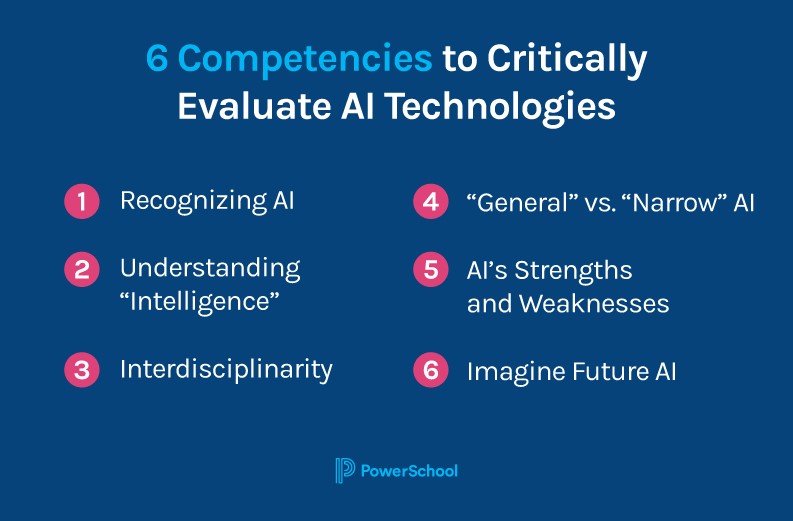
7 Classroom Strategies For Promoting AI Literacy In The Classroom
7th October 2024
Research reveals that in 2023, 250 million people worldwide used AI, and the number is expected to increase to 700 million by the next 10 years.
AI is affecting almost every part of our lives, including our jobs and shopping, thus everyone must become literate in technology. However since educators with an MA in special education are in charge of raising the next generation of critical thinkers who will navigate and mold our AI-driven environment going forward, they should know this information even more. Before teachers can help students develop their AI literacy, they first need to commit to studying everything there is to know about the topic.
What Is AI Literacy?
The knowledge and abilities that allow us to comprehend artificial intelligence (AI), consider its potential and constraints critically, and use it efficiently for a variety of activities is known as AI literacy. While knowledge of and proficiency with AI technology are components of AI literacy, the idea encompasses more.

Understanding how AI may support or contradict the teaching and learning process is a key component of AI literacy in the educational setting. Teachers may use AI, for instance, to provide pupils feedback on time. Technology will, however, impair teachers' capacity to provide high-quality instruction and decrease students' prospects of meeting learning objectives if technology is used to substitute human connection.
Do you follow us on Social Media? We regularly share upgraded educational content, tips, feedback, and more. Check us out by clicking the profiles here - Facebook / Twitter / LinkedIn / Pinterest / Instagram / YouTube
Why Is AI Literacy Important?
Here are a few reasons why educators with an MA in Education with SEN should try building AI literacy in students:
- Future-Proofing Careers
AI is changing whole sectors, displacing existing jobs, and generating new ones. Students may better prepare for the future labor market, when AI talents will be highly valued, by learning about AI.
- Enhancing Problem-Solving Skills
AI literacy promotes problem-solving and critical thinking. Students gain the vital ability of systematic problem-solving through data-driven decision-making, which applies to any sector.
- Informed Citizenship
As AI influences society in numerous ways, from privacy problems to job displacement, students need to be informed citizens who grasp the consequences of AI and can participate in conversations about its ethical usage.
- Empowering Innovation And Creativity
Comprehending artificial intelligence enables learners to utilize technology imaginatively, whether crafting novel applications, refining current procedures, or experimenting in domains such as science, commerce, and the arts.
3-Step Framework To Build AI Literacy In Students
In the era of chatbots, generative AI tools, and other cutting-edge technology, educators must have a framework for defining AI literacy and encouraging it among students.
There are three ways to engage with it: comprehend, assess, and apply.
1. Understand
For users to make educated judgments about the use and assessment of AI tools, the ‘understand’ component entails learning the fundamentals of what artificial intelligence (AI) is capable of. For instance, to determine when and for what purposes to employ AI, educators, and students need to be able to comprehend fundamental AI functions like speech recognition and decision-making.
2. Evaluate
Next, the ‘evaluate’ part speaks about applying human judgment to critically assess how AI helps and hurts people, society, and the environment. Teachers could assess how AI frequently ‘hallucinates’ or yields false findings, for example, and have a conversation with pupils about AI's role in spreading false information.
3. Use
The ‘use’ portion of the architecture deals with utilizing AI for various settings and goals through problem-solving, creation, and interaction. For instance, teachers may utilize AI to create student handouts and encourage students to use the technology to develop ideas for essay themes.
4 Strategies To Develop AI Literacy In Classroom
Here are a few strategies you can apply to promote literacy among your students:
1. Improve Your AI Literacy
Make sure you understand AI well before attempting to help pupils become more AI literate. You should make sure you know how to utilize common AI technologies in addition to having a conceptual understanding of the field, particularly if doing so would enhance your productivity at work or the educational experience for your students.
One AI tool may be used to create lesson plans, while another could be used to grade assignments or create unique tests for students.
2. Gauge Students Current AI Awareness
Ask students to complete a questionnaire to determine their current level of AI literacy. You may ask students to define artificial intelligence (AI), explain how it operates, and explain how they use it in short answer questions. Additionally, students might name instances of AI in the actual world and the jobs it can accomplish.
You may determine where students are knowledgeable about AI and where they are puzzled by looking at their questionnaire replies. Create a successful approach to broaden students' understanding and dispel any misunderstandings they may have regarding artificial intelligence based on your findings.
3. Establish Clear Guidelines
Students may utilize AI in different ways—from generating tailored study schedules to answering homework queries. Be explicit about how they should and shouldn't use it because of this. Make careful to include a justification for each use case as you outline them.
Students will be inspired to consider AI critically and use it purposefully as a result. Explain how you utilize AI to complement, not replace, your position as an educator to encourage trust and transparency in students and help them comprehend ethical AI usage.
4. Incorporate AI Tools In The Classroom
Model responsible, moral, and efficient use of AI in the classroom to show others what this means. Allow students to play AI-powered educational games to prepare for tests and identify trustworthy references for their papers using various methods.
Teaching students how to write powerful prompts is another method to introduce AI to the classroom. They will get quick engineering skills from this, which are essential in today's workforce. Additionally, it will inspire students to consider AI and its limits in greater detail.
Prepare Students For The Future
The necessity of AI literacy will only increase as AI technology advances and spreads. While everyone has to get a thorough knowledge of artificial intelligence (AI) and its implications for society, educators with an MA in Education with SEN in particular need to make sure they fully comprehend the idea to provide their students with the tools they need to succeed in an AI-driven future.
We believe education should be accessible for everyone. That’s why we don’t charge for our blogs. Find the right course that will help you in your career with us, contact us at +6621056101. You can mail us at act@asiancollegeofteachers.com
Written By : Laura Taylor




